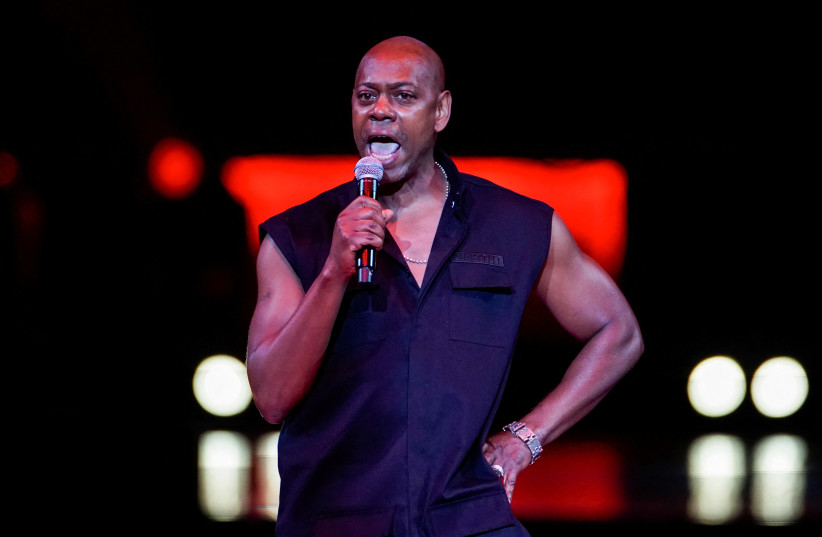Less than a year and a half ago, comedian Dave Chappelle was spouting the antisemitic trope that “Jews control Hollywood” on Saturday Night Live (SNL): “I’ve been to Hollywood, this is just what I saw... It’s a lot of Jews. Like, a lot.”
Interestingly, his racist comments drew 4.8 million viewers, a record number for that season’s SNL, and a further eight million plus viewers on YouTube.
They also drew criticism from the Anti-Defamation League (ADL) as well as antisemitism researcher Prof. Pamela Nadell, who told the Jewish Telegraphic Agency (JTA), “I was very disturbed to see him speaking, to millions of people, a lot of antisemitic tropes.”
These tropes, which have plagued show business for over a century, stemmed from the fact that nearly every major movie studio was founded in the early 1900s by a group of first-generation secular Jews who immigrated to the United States from Eastern Europe: Carl Laemmle (Universal), Adolph Zukor (Paramount), William Fox (Fox), Louis B. Mayer (MGM), and Benjamin Warner (Warner).
With antisemitic barriers preventing Jewish immigrants at the time from joining many of the more well-established industries, Hollywood, with its lack of guardrails, was one of the few from which Jews weren’t excluded. As such, the film industry seemed the obvious choice for these creative Jewish businessmen.

In addition to the movies, the garment, and publishing industries also attracted Jews, Nadell said, “because there were so many other sectors of the economy where they were barred from.”
Historian Neal Gabler expanded on this in his book An Empire Of Their Own: How The Jews Invented Hollywood. “There were no social barriers in a business as new and faintly disreputable as the movies were in the early years of [the 20th] century,” he writes, whereas “impediments [were] imposed by loftier professions and more firmly entrenched businesses to keep Jews and other undesirables out.”
HOWEVER, EVEN though the face of Hollywood has changed greatly since then, with most of the studios being swallowed up by huge corporations, the dangerous antisemitic tropes and conspiracy theories surrounding Jews and their role in the industry persist.
“Jews remain active in Hollywood in a variety of roles, but it would be impossible to say that they run Hollywood, that they own Hollywood,” Nadell said. “Whenever the Jews enter into any kind of position where they might have influence over people who are not Jewish, then all of a sudden it’s seen as some kind of conspiracy,” she explained.
While success in Hollywood was there for the taking, it came at a heavy price for Jews who, in order to get on, had to effectively extinguish their Jewishness. While many changed their names, sickeningly, some even went out of their way to avoid offending Hitler during the Nazi era by not featuring Nazis as villains in the prewar years.
As the decades wore on, however, things changed and Jews no longer felt the need to hide their identities in Hollywood.
“Being Jewish in Hollywood is like wanting to be in the popular circle and immediately being accepted as I have been in that circle, by a lot of diversity but also by a lot of people who in fact are Jewish.” Steven Spielberg remarked recently.
Nevertheless, as evidenced above, the tropes remain as does the underlying animosity.
“If they’re Black, then it’s a gang. If they’re Italian, it’s a mob. If they’re Jewish, it’s a coincidence and you should never speak about it,” said Chappelle on SNL, whose executive producer, Lorne Michaels, happens to be Jewish.
Many celebrities, particularly those in the liberal arts sector, increasingly feel pressured to adopt and espouse the fashionable and highly vocal cause du jour so as not to damage their brand. This has become particularly prevalent over the past few months following the Hamas attack on October 7 that led to the war against Hamas in Gaza.
As pro-Palestinian sentiment has grown and become more vocal, causing a steep rise in Jew and Israel-hatred, these crowd-pleasers have been either cowed into silence or are bending over backward to make sure they don’t offend groups like Boycott, Divest, Sanction (BDS) that could damage them or their brand.

THIS WAS brought into sharp relief earlier this week at the Oscars. Celebrities had to make their way through a pro-Palestinian demonstration before entering the theater, which set the tone for what was to follow.
Jewish director Jonathan Glazer’s acceptance speech for his Best International Feature award for The Zone of Interest was perhaps the most shocking and disturbing part of the ceremony.
“All our choices were made to reflect and confront us in the present – not to say, ‘Look what they did then,’ rather, ‘Look what we do now.’ Our film shows where dehumanization leads, at its worst. It shaped all of our past and present. Right now we stand here as men who refute their Jewishness and the Holocaust being hijacked by an occupation, which has led to conflict for so many innocent people. Whether the victims of October the 7th in Israel or the ongoing attack on Gaza, all the victims of this dehumanization, how do we resist?”
While his speech has drawn criticism from Jewish groups far and wide, it was met with wide applause in the auditorium.
As Combat Antisemitism Movement CEO Sacha Roytman Dratwa said, “It is Glazer himself who has hijacked his important portrayal of the Holocaust to assist in the dehumanization of the fight for Jewish survival, while not saying a word about the tsunami of antisemitism facing Jews globally.”
Although Glazer used his speech as a vehicle to air his views on the conflict, at no time did he, or anyone else there, mention the hostages, 134 of whom remain in Gaza. The yellow ribbon pins highlighting their plight were in short supply too, some even removing them as they made their way into the theater, not to cause a scene.
The failure to support the hostages wasn’t due to an overall reluctance to bring politics into the ceremony. Quite the contrary – many celebrities pinned their colors firmly to their chests by wearing red-hand pins created as part of the Artists4Ceasefire campaign.
While it is unclear whether these celebrities, whose number included Billie Eilish and Ramy Youssef, knew the significance of red hands – it is associated with one of the most horrific events imprinted on the minds of Israelis: the gruesome lynching of two young Israelis in Ramallah in 2000 – the fact that the pin became a symbol of the ceremony has left many profoundly distressed.
So, far from Jews controlling Hollywood, it would seem that in order to get ahead, now more than ever, they must bury their Jewishness and keep their heads down or prostrate themselves before the antisemites to curry favor, while distancing themselves from their fellow Jews.
It’s a sorry state of affairs, yet, sadly, one that is spreading through all areas of society.
The writer is a former lawyer from Manchester, England who now lives in Israel and works as a freelance writer.
